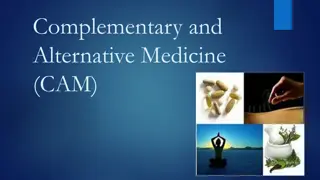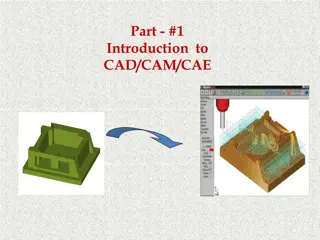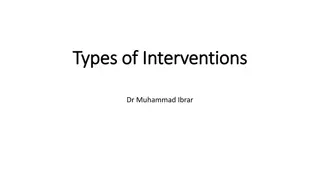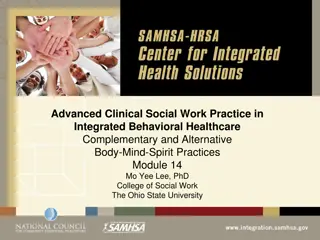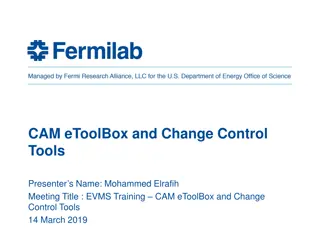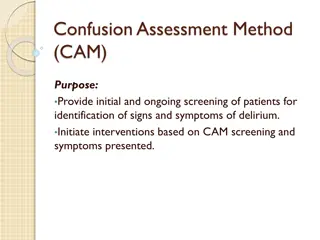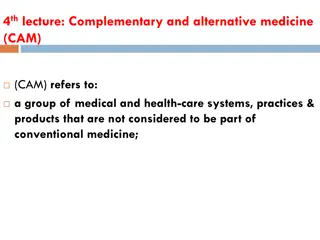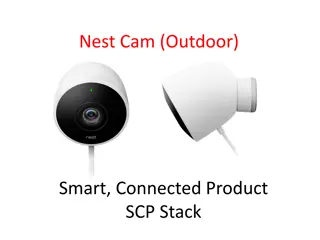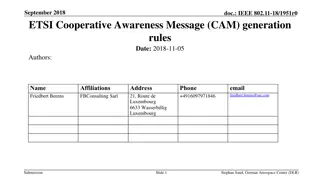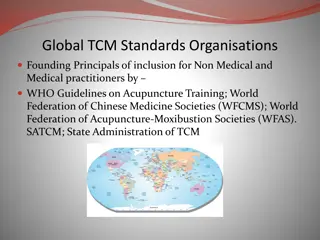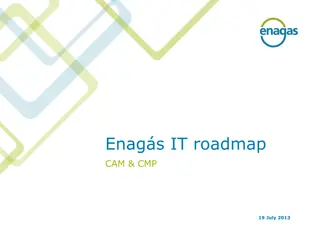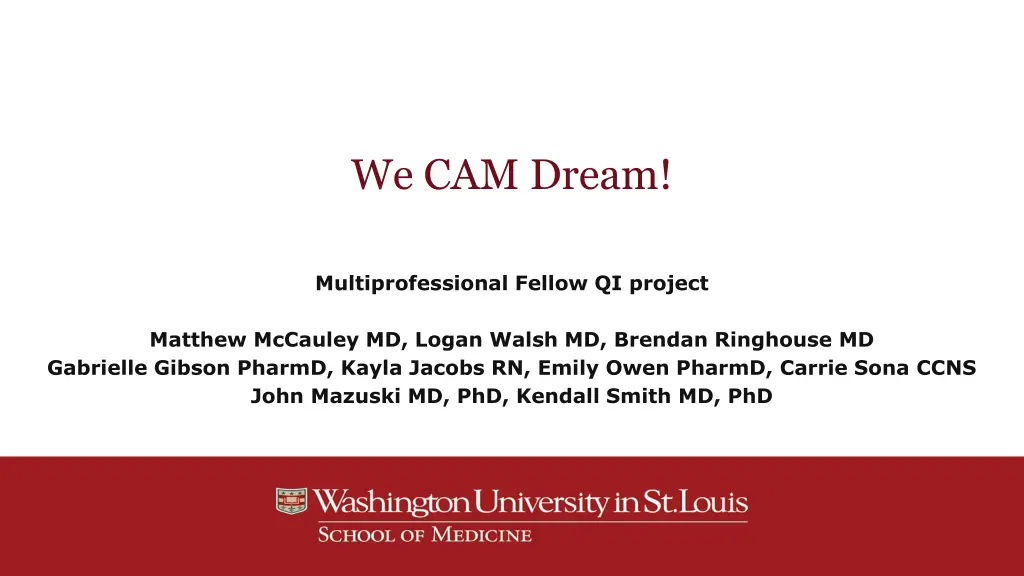
Understanding Delirium: Assessment, Prevention, and Management in ICU Settings
Explore the comprehensive project goals and strategies for improving recognition and management of delirium in the ICU, including risk factors, assessment methods, and non-pharmacologic interventions. Learn how a multiprofessional team aims to enhance patient outcomes and reduce mortality through targeted interventions and standardized care protocols.
Uploaded on | 1 Views
Download Presentation

Please find below an Image/Link to download the presentation.
The content on the website is provided AS IS for your information and personal use only. It may not be sold, licensed, or shared on other websites without obtaining consent from the author. If you encounter any issues during the download, it is possible that the publisher has removed the file from their server.
You are allowed to download the files provided on this website for personal or commercial use, subject to the condition that they are used lawfully. All files are the property of their respective owners.
The content on the website is provided AS IS for your information and personal use only. It may not be sold, licensed, or shared on other websites without obtaining consent from the author.
E N D
Presentation Transcript
We CAM Dream! Multiprofessional Fellow QI project Matthew McCauley MD, Logan Walsh MD, Brendan Ringhouse MD Gabrielle Gibson PharmD, Kayla Jacobs RN, Emily Owen PharmD, Carrie Sona CCNS John Mazuski MD, PhD, Kendall Smith MD, PhD
Goals of the Project Improve recognition, discussion, and documentation of delirium and sleep disturbance in 44 ICU Improve provider comfort with and knowledge of management of delirium related symptoms Promote non-pharmacologic management of delirium and sleep Standardize pharmacologic management of delirium related symptoms and sleep disturbance Department of Anesthesia Critical Care Medicine
Goals of this presentation Describe delirium as a medical condition Understand the utility and limitations of the CAM ICU Locate CAM ICU and delirium related documentation in the EMR Become familiar with non-pharmacologic prevention of delirium Understand the limitations of pharmacologic interventions to prevent and manage delirium Understand the impact of sleep disturbance and strategies to avoid sleep disturbance Department of Anesthesia Critical Care Medicine
Delirium Fluctuating course of impaired cognitive functioning with acute onset Associated with: Increased mortality Longer length of stay Increased institutionalization post-ICU Long term cognitive impairment Experienced by up to 50% of patients with lower-severity illness and up to 80% of mechanically ventilated patients Department of Anesthesia Critical Care Medicine
Delirium Assessment, Prevention, and Management Key Component of the ABCDEF Bundle Bundle implementation shown to decrease 7 day hospital mortality by 68% From SCCM Department of Anesthesia Critical Care Medicine
Delirium Risk Factors Strong evidence of increased risk of Delirium Blood transfusion Benzodiazepine use Increasing age Dementia Prior coma Emergency surgery or trauma Increasing APACHE Score Modifiable Risk Factors! Strong evidence of no impact on risk of delirium Sex assigned at birth Opioid use Mechanical ventilation 2018 PADIS Guidelines Department of Anesthesia Critical Care Medicine
Assessing Delirium Critically ill adults should be regularly assessed for delirium using a validated tool - SCCM 2018 Physicians consistently fail to recognize delirium without established screening tools CAM-ICU prefered assessment tool for 4400 ICU - Binary assessment: patient either has or does not have delirium at the time of assessment Department of Anesthesia Critical Care Medicine
Assessing Delirium CAM-ICU and sleep quality should be explicitly mentioned in the discussion of the Neurologic system on rounds Delirium and sleep quality are infrequently discussed during ward rounds in 4400 ICU CAM-ICU = vital sign of the brain Department of Anesthesia Critical Care Medicine
In a review of rounding practices in 4400 ICU, delirium was discussed explicitly in only 9% of patients and the CAM-ICU score was discussed in only 3% of patients Was Delirium Discussed? Was CAM-ICU Discussed? Department of Anesthesia Critical Care Medicine
Locating CAM-ICU Documentation 1. Flowsheets 2. Complex Assessment 3. Search CAM-ICU or Confusion 4. CAM-ICU lives here Department of Anesthesia Critical Care Medicine
1. Summary 2. Flowsheet 3. CAM-ICU lives here Department of Anesthesia Critical Care Medicine
Preventing Delirium The potential risks and costs of exposing a large proportion of the critically ill adult population to one or more medications aimed at preventing delirium outweighs any benefit Society of Critical Care Medicine 2018 No medication has been proven to reduce delirium or its adverse effects Randomized studies have failed to demonstrate that the following prevent delirium Haloperidol Atypical antipsychotics Dexmedetomidine Statins Ketamine Scheduled Dexmedetomidine may reduce incidence of delirium in low acuity patients but still not routinely recommended Skrobrik et al 2018 Am Journ Resp Care Med 2018 PADIS Guidelines Department of Anesthesia Critical Care Medicine
Treating Delirium: Pharmacologic No high quality evidence has demonstrated that the use of medications to manage delirium symptoms have any benefit in regards to: Shorter duration of delirium Shorter ICU LOS Decreased Mortality Dexmedetomidine is recommended for management of delirium symptoms that interfere with attempts at extubation Increases ventilator free hours Read et al 2016 JAMA Pharmacologic interventions indicated for acute symptom management Management should otherwise focus on non-pharmacologic interventions! 2018 PADIS Guidelines Department of Anesthesia Critical Care Medicine
Treating Delirium: Pharmacologic Breakthrough Agitation CAM-ICU+ RASS > 0 Haloperidol Olanzapine Ziprasidone Hyperactive Delirium CAM-ICU+ RASS > 0 Quetiapine Olanzapine Risperidone Ziprasidone Hyperactive Delirium CAM-ICU+ RASS >0, QTc > 480 or- unresponsive to antipsychotics Valproic acid Dexmedetomidine Department of Anesthesia Critical Care Medicine
Managing Delirium: Non-Pharmacologic We suggest using a multicomponent nonpharmacologic intervention that is focused on reducing modifiable risk factors for delirium Society of Critical Care Medicine 2018 2018 PADIS Guidelines Department of Anesthesia Critical Care Medicine
Prevent Cognitive Impairment - frequent reorientation to the environment, cognitive stimulation, music, use of clocks Oversedation/Sleep Disruption - reduce pharmacologic sedation, minimize light and noise Imobility - early mobilization and physical rehabilitation, minimize restraints Hearing and Visual Impairment - ensure access to hearing aids and glasses Department of Anesthesia Critical Care Medicine
Managing Delirium: Non-Pharmacologic Use of Non-Parmacologic interventions has been shown to reduce ICU LOS and all cause in-hospital mortality! 2018 PADIS Guidelines Department of Anesthesia Critical Care Medicine
Sleep Disruption Common complaint and source of distress for ICU patients Characterized by: Sleep fragmentation Increased light sleep Decreased slow wave and REM sleep Associated With: ICU delirium Prolonged duration of mechanical ventilation Neurocognitive dysfunction Department of Anesthesia Critical Care Medicine
Pharmacologic Management Melatonin Derivatives PADIS Guideline: no recommendation Inexpensive, benign side effect profile Dexmedetomidine PADIS Guideline: no recommendation May improve sleep architecture Propofol PADIS Guideline:not recommended for promotion of sleep Associated with suppression of REM sleep NO Medication has been found to have a high level of evidence to improve sleep quality and reduce sleep disturbance in the ICU Department of Anesthesia Critical Care Medicine
Pharmacologic Management Recommended for Disordered Sleep without Hyperactive Delirium Ramelteon Trazadone Eszoplicone Medications to avoid for sole indication of sleep promotion Benzodiazepines Diphenhydramine Antipsychotics NO Medication has been found to have a high level of evidence to improve sleep quality and reduce sleep disturbance in the ICU Department of Anesthesia Critical Care Medicine
Non-Pharmacologic Management Focus on maximizing non-pharmacologic measures to promote sleep! Daytime Utilize overhead lights and natural sunlight Discourage napping Maximize mobility and patient stimulating activities Nighttime Noise reduction Light reduction Limit overnight interuptions in sleep Department of Anesthesia Critical Care Medicine
Post test time! 7 short questions and < 5 minutes to complete https://forms.office.com/r/0FvCefE55J OR SCAN QR CODE Department of Anesthesia Critical Care Medicine

